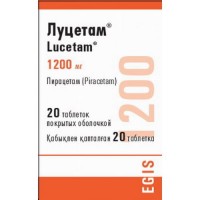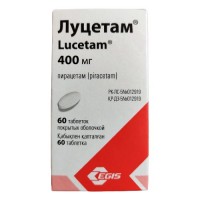
Unlocking the potential of Piracetam: The science, benefits, and risks of a popular nootropic
Piracetam is a popular nootropic compound that has gained significant attention in recent years due to its potential cognitive-enhancing effects.
Developed in the 1960s by a Romanian chemist, Piracetam was initially used to treat motion sickness and vertigo.
However, it was soon discovered that Piracetam had the potential to enhance memory and cognition.

What is Piracetam?
Piracetam is a nootropic compound that belongs to the class of drugs called racetams. It is a derivative of the neurotransmitter GABA (gamma-aminobutyric acid), and it works by modulating the activity of several neurotransmitters in the brain, including acetylcholine and glutamate. This modulation is thought to improve cognitive function and enhance memory and learning.
The chemical composition of Piracetam is unique compared to other nootropics. It has a pyrrolidone nucleus, which is not found in other racetams or GABA analogues. This structural difference is thought to be responsible for the specific cognitive-enhancing effects of Piracetam.
Research on Piracetam has shown that it has a number of effects on the brain. For example, it has been found to increase blood flow to the brain, improve oxygen uptake, and increase glucose metabolism. Additionally, Piracetam has been shown to enhance the activity of certain neurotransmitter receptors, including those for acetylcholine and glutamate. These effects are thought to be responsible for the cognitive-enhancing effects of Piracetam, including improvements in memory, learning, and attention.
A number of studies have investigated the effects of Piracetam on the brain and cognitive function. One study found that Piracetam improved memory in healthy individuals, while another found that it enhanced cognitive function in patients with dementia. Other studies have found that Piracetam improved attention, learning, and verbal ability in healthy individuals. While there is still much to learn about Piracetam, these findings suggest that it may be a promising cognitive enhancer for a wide range of individuals.
Benefits of Piracetam
Piracetam is known for its potential cognitive-enhancing effects. Some of the benefits of Piracetam include improved memory, concentration, mental clarity, and cognitive flexibility. These benefits are believed to result from Piracetam’s ability to enhance the activity of neurotransmitter receptors in the brain.
Several scientific studies have investigated the effects of Piracetam on cognitive function. For example, a study published in the Journal of Psychopharmacology found that Piracetam improved working memory and cognitive flexibility in healthy individuals. Another study published in the journal Psychopharmacology found that Piracetam improved memory in elderly individuals with memory deficits.
Other studies have found that Piracetam may be effective in improving cognitive function in individuals with dementia or other cognitive disorders. For example, a study published in the Journal of Neuropsychiatry and Clinical Neurosciences found that Piracetam improved memory, attention, and other cognitive functions in patients with Alzheimer’s disease.
In addition to scientific research, there is also anecdotal evidence from users who have reported positive effects from taking Piracetam. Many users report improved memory, concentration, and mental clarity, as well as increased motivation and productivity. However, it’s important to note that anecdotal evidence is not a substitute for scientific research and should be taken with a grain of salt.
Overall, the research and anecdotal evidence suggest that Piracetam may have potential cognitive-enhancing effects for a wide range of individuals. However, it’s important to consult with a healthcare professional before taking Piracetam or any other nootropic supplement.
Dosage and Safety
When it comes to dosing Piracetam, there is no one-size-fits-all recommendation. The ideal dosage will depend on several factors, including an individual’s body weight, age, and overall health. Generally, a typical Piracetam dose ranges from 1,200 to 4,800 mg per day, split into two or three doses. However, it’s important to start with a lower dose and gradually increase it to avoid any potential side effects.
Piracetam is generally considered safe when taken as recommended. However, some users may experience mild side effects such as headaches, dizziness, and gastrointestinal discomfort. These side effects can usually be managed by reducing the dose or taking Piracetam with food. In rare cases, more serious side effects such as agitation, insomnia, or allergic reactions may occur. If you experience any of these symptoms, it’s important to stop taking Piracetam immediately and consult a healthcare professional.
It’s important to take precautions when taking Piracetam, especially if you have a pre-existing medical condition or are taking other medications or supplements. Piracetam may interact with certain medications, including blood-thinners, anti-platelet drugs, and anti-convulsants. It’s important to speak with a healthcare professional before taking Piracetam, especially if you are taking any medications or have a history of medical conditions.
Lastly, it’s important to purchase Piracetam from a reputable source to ensure its safety and quality. While Piracetam is legal in many countries, it’s important to check the legal status in your country before purchasing it. Additionally, it’s important to store Piracetam in a cool, dry place, away from sunlight and heat, to prevent degradation of the compound.
Piracetam vs. Other Nootropics
Piracetam is just one of many popular nootropics on the market today. Two other commonly used nootropics are Modafinil and Phenylpiracetam. While these substances all have cognitive-enhancing effects, they differ in their mechanisms of action, benefits, and drawbacks.
Modafinil is a wakefulness-promoting agent that is often used to improve alertness and focus. It works by increasing the levels of certain neurotransmitters in the brain, including dopamine and norepinephrine. Modafinil is particularly popular among individuals who need to stay awake and alert for long periods of time, such as students or shift workers. However, it can also have side effects such as headache, nausea, and anxiety.
Phenylpiracetam is a derivative of Piracetam and is believed to have stronger cognitive-enhancing effects. It works by increasing the activity of certain neurotransmitter receptors in the brain, including those for acetylcholine and dopamine. Phenylpiracetam is particularly popular among athletes and individuals who want to improve their physical performance, as well as students and professionals who need to stay focused and productive. However, like other nootropics, it can have side effects such as headache, anxiety, and insomnia.
Compared to Modafinil and Phenylpiracetam, Piracetam has a more general cognitive-enhancing effect. It works by improving the communication between neurons in the brain, leading to improved memory, concentration, and mental clarity. Piracetam is generally considered to have fewer side effects than Modafinil or Phenylpiracetam, but its effects may be less potent.
In summary, while Piracetam, Modafinil, and Phenylpiracetam are all popular nootropics with cognitive-enhancing effects, they differ in their mechanisms of action and the benefits and drawbacks they offer. It’s important to consult with a healthcare professional before taking any nootropic supplement, and to choose a supplement that best meets your individual needs and goals.
Final Thoughts on Piracetam as a Nootropic Supplement
In conclusion, Piracetam is a popular nootropic supplement that has been shown to have cognitive-enhancing effects, such as improved memory, concentration, and mental clarity. While Piracetam is generally considered safe, it’s important to follow recommended dosages and take precautions if you have pre-existing medical conditions or are taking other medications or supplements. Potential side effects of Piracetam include headaches, dizziness, and gastrointestinal discomfort, and in rare cases, more serious side effects may occur.
While the scientific research on Piracetam is promising, there is still a need for further studies to determine the long-term effects of this supplement. It’s important to consult with a healthcare professional before taking Piracetam, especially if you have any pre-existing medical conditions or are taking other medications.
If you are considering taking Piracetam as a nootropic supplement, it’s important to purchase it from a reputable source and follow recommended dosages. Additionally, it’s important to remember that nootropics should not be used as a substitute for healthy lifestyle habits, such as regular exercise, a balanced diet, and adequate sleep.
Overall, Piracetam has the potential to be a useful supplement for individuals looking to enhance their cognitive abilities, but it’s important to proceed with caution and to prioritize your overall health and well-being.
References
Gouliaev AH, Senning A. Piracetam and other structurally related nootropics. Brain Res Brain Res Rev. 1994 May;19(2):180-222. doi: 10.1016/0165-0173(94)90011-6. PMID: 8061686.
Winblad B. Piracetam: a review of pharmacological properties and clinical uses. CNS Drug Rev. 2005 Winter;11(1):169-82. doi: 10.1111/j.1527-3458.2005.tb00024.x. PMID: 15867943.
Morgan A, Stevens J. Does Bacopa monnieri improve memory performance in older persons? Results of a randomized, placebo-controlled, double-blind trial. J Altern Complement Med. 2010 Jul;16(7):753-9. doi: 10.1089/acm.2009.0342. PMID: 20636139.
Fond G, Micoulaud-Franchi JA, Brunel L, Macgregor A, Miot S, Lopez R, Richieri R, Abbar M, Lançon C, Repantis D. Innovative mechanisms of action for pharmaceutical cognitive enhancement: A systematic review. Psychiatry Res. 2015 Dec 30;229(1-2):12-20. doi: 10.1016/j.psychres.2015.07.006. Epub 2015 Jul 9. PMID: 26211607.
Nootropics Expert [Internet]. Piracetam; [cited 2023 Mar 26]. Available from: https://nootropicsexpert.com/piracetam/.
Panossian A, Wagner H. Stimulating effect of adaptogens: an overview with particular reference to their efficacy following single dose administration. Phytother Res. 2005 Oct;19(10):819-38. doi: 10.1002/ptr.1751. PMID: 16261511.
Sánchez-Santed F, Colomina MT. Effect of nootropic drugs on brain cholinergic enzymes in rats. Gen Pharmacol. 1998 Apr;30(4):571-3. doi: 10.1016/s0306-3623(97)00246-8. PMID: 9570423.
U.S. National Library of Medicine [Internet]. Piracetam; [updated 2022 Nov 15; cited 2023 Mar 26]. Available from: https://medlineplus.gov/druginfo/meds/a682530.html.


